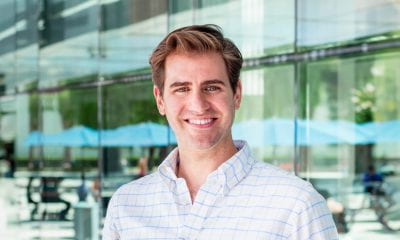Celebrating Pride with the Queer Educators and Counselors Network: A Q&A with Robert Marx
Robert Marx, co-founder of SJSU’s Queer Educators and Counselors Network (QECN), shares why celebrating and recognizing Pride Month is especially important this year. Photo by Brian Cheung Dooley.
In honor of Pride month, Marx answered a few questions about why groups like QECN are growing ever more important.
What is the Queer Educators and Counselors Network?
Robert Marx (RM): QECN is the result of our desire to create an inclusive, queer-affirming space at SJSU and in the community. Kyoung Mi and I met at the new-hire orientation and since there was such a great, generative energy between us, we knew we wanted to start something. So Kyoung Mi and I partnered to create QECN, and we now lead trainings and events across campus and in the larger community. Our work focuses on cultivating knowledge, empathy and hope, and we encourage our peers, colleagues, neighbors, and friends to work to make their corner of the world as queer-affirming as possible.
What resources do you wish you could have accessed as college students?
RM: I was very lucky as a college student to have access to several key resources — an LBGTQ+ student group, a strong community on campus, and faculty who encouraged me to conduct research with the LGBTQ+ community. Despite this, I faced discrimination and harassment on campus, and I didn’t really feel like I had anywhere to turn to get help. When I was in college, I wish I had had administrators and faculty who took a stronger, more proactive stance to create an inclusive environment. It is so important for the university to go out of its way to ensure that hatred and discrimination aren’t welcome, and to ensure that LGBTQ+ college students’ experiences are marked by joy, love, discovery and hope.
Given the recent rise in anti-LGTBQ+ legislation introduced across the country, why is it especially important that people of all identities recognize and celebrate Pride?
RM: We are facing an unprecedented war against LGBTQ+ people — and transgender people, specifically — with record-breaking numbers of bills being introduced, discussed and passed that attempt to dehumanize, criminalize, erase and vilify queer and trans people. Against that backdrop, it is more important than ever that allies vocally proclaim their support of queer and trans people. When our elected officials are trying to ban the books that students read, bar access to life-saving healthcare, and keep transgender students from using the bathroom, we need vocal supporters to affirm what we all know is true: Queer and trans people belong, we are beautiful, and we are a vital part of our society.
Remember, though, that Pride is not a party — it’s a riot. We all like to get glitter on and go dancing (and we definitely should), but we can’t let that distract us from the war being waged against us. If you want to show up for the party, you’ve got to do your part in the fight, too.
How can Spartans get involved in the QECN?
RM: Because it’s summer, QECN is on a little bit of a break, regrouping and recharging. Spartans should be on the lookout for events as the fall semester starts back up! And, of course, we love hearing from students who want to talk about gender and sexuality, who want to help out with research, or who want to get involved in planning our programs!
What does Pride and/or Pride month mean to you?
RM: For me, Pride is a time of reflection, celebration and resistance. It’s a time when I take stock of all the love I have in my life, all the happiness I am privileged to enjoy, all the light that my queerness has brought me. Sometimes that looks like a dance party and a night out with friends. Other times, it looks like donating to a charity or mutual aid network that is helping to improve the lives of queer and trans people — especially queer and trans people of color, disabled queer and trans people, and undocumented queer and trans people. It’s buying cute clothes from queer and trans designers, eating good food with people I love, and calling legislators to hold them accountable.
Learn more about the Queer Educators and Counselors Network at SJSU.




